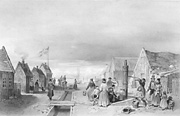A Ship Comes In, 1830 |
Skipkoma, 1830 |
|
Lárus and I had been waiting for a ship to arrive and were growing impatient for letters from our friends in Denmark. On the first day of summer I rose early in the morning and saw a merchantman approaching under sail. When I got back home, L. asked whether "the bard" had seen a ship. |
Við Lárus biðum skipkomu og leiddist eftir bréfum vina vorra í Höfn. Sumardagsmorguninn fyrsta var ég snemma á fótum og sá kaupfar undir uppsiglingu. Þegar ég kom heim spurði L. hvurt "skáldið" hefði ekki séð skip? |
|
|
The Farmer in Wet Weather |
Texts and Commentaries |
Iceland |
|---|
